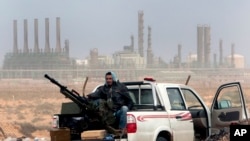Footage of a ruptured pipeline dumping large amounts of crude oil into the Libyan desert circulated social media on Wednesday. A Libyan army patrol discovered the leak in a land pipeline that connects the Sarir oil field to the Tobruk port in the country's east, according to authorities.
The Arabian Gulf Oil Company (AGOC), which manages the oil field, issued a statement Tuesday blaming the damage on "budget delay" and therefore "the company's inability" to conduct necessary maintenance. The company estimated in that statement that the leak is costing the country 22,000 barrels per day.
The Libyan Ministry of Oil and Gas refuted this narrative, claiming that the incident was caused by a lack of financial transparency rather than a lack of funds.
"The attribution of all problems and challenges to the budget is not justified because the volume of spending in the past years was huge. The technical problems the sector has been exposed to since 2011 lack accuracy and fairness," the Ministry said in a statement Wednesday.
“Production has fallen by about 600,000 barrels a day,” Minister of Oil and Gas Mohammed Aoun said in April during an interview with AFP at his office in Tripoli.
“Calculating the sale price at $100 a barrel, losses are at least $60m daily,” he added.
Adding to the situation is southern Libyan tribal leaders shutting down the country's largest oil field for over a month, the latest closure of an oil facility amid a bitter standoff between two rival governments.
Libya's "sweet" [low sulfur content] crude has long been a focus of contention in the country's civil war, with rival militias and foreign powers vying for control of the continent's largest oil reserve.
Analysts say the Libyan oil industry's infrastructure deterioration results from repeated conflict-related sabotage, maintenance delays, and the halting of both production and exports.
Some information for this report came from AP and AFP
.









